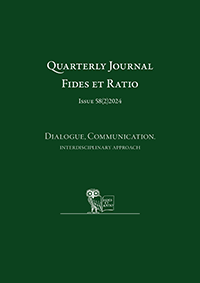Abstract
The paper discusses the relationship between the length of employment and burnout among programmers in the conceptualisation of ressentiment. Due to the lack of extensive studies in the literature on the impact of the length of employment on burnout in programmers, in the light of ressentiment, the authors decide to broaden the knowledge on this topic. In this study, the aim is to demonstrate the impact of the length of employment on the occurrence of burnout in programmers. A total of 80 men who deal with programming every day were studied. The respondents were characterised by a variety of length of employment from 1 year to 40 years. In order to measure the variables, the Burnout Questionnaire (LBQ) and the OLBI Questionnaire (The Oldenburg Burnout Inventory) were used to examine burnout and its components: psychophysical exhaustion, lack of engagement with clients, feelings of lack of professional effectiveness, and disappointment. Research tools such as the KR Resentment Questionnaire and the Gotland Male Depression Scale (GMDS) were also used to measure distress.
References
Bakker, A.B., Demerouti, E., & Schaufeli, W.B. (2002). Validation of the Maslach Burnout Inventory General Survey: an internet study. Anxiety, Stress, & Coping, 15(3), 245-260. https://doi.org/10.1080/1061580021000020716
Bianchi, R., Verkuilen, J., Schonfeld, I.S., Hakanen, J.J., Jansson-Fröjmark, M., Manzano García, G., & Meier, L.L. (2021). Is burnout a depressive condition? A 14-sample meta-analytic and bifactor Analytic Study. Clinical Psychological Science, 9(4). https://doi.org/10.1177/2167702620979597
Bilska, E. (2004). Jak Feniks z popiołów, czyli syndrom wypalenia zawodowego. Niebieska Linia, 4, 1-8.
Borys, B., Majkowicz, M. (2006). Psychologia w medycynie. Wydawnictwo AMG.
Cherniss, C. (1980). Staff Burnout. Job Stress in Human Service. Sage.
Cherniss, C. (1993). Role of Professional Self-efficacy in the Etiology and Amelioration of Burnout. (In:) W.B. Schaufeli, C. Masłach, T. Marek (eds.), Professional Burnout: Recent Developments in Theory and Research, 135-143. Taylor & Francis.
Czapiński, J. (2024). Psychologia pozytywna. Nauka o szczęściu, zdrowiu i cnotach człowieka. Wydawnictwo Naukowe PWN.
Edelwich, J., Archie, B. (1980). Burn-out: Stages of disillusionment in the heling professions. Human Sciences Press.
Fengler, J. (2001). Pomaganie męczy. Gdańskie Wydawnictwo Psychologiczne.
Geuens, N., Braspenning, M., Van Bogaert, P., & Franck, E. (2015). Individual vulnerability to burnout in nurses: The role of Type D personality within different nursing specialty areas. Burnout Research, 2, 80-86.
Golembiewski, R.T., & Munzenrider, R.R. (1991). Alternative combinations of phases of burnout: An illustrative exercise. Journal of Health and Human Resources Administration, 13(4), 489-507.
Gruszczyńska, M., Skowrońska, E., Bator, A., & Bąk-Sosnowska, M. (2014). Staż pracy, poziom wypalenia zawodowego i strategie radzenia sobie ze stresem wśród położnych. Medycyna Ogólna i Nauki o Zdrowiu, 20(3), 276-281.
Hobfoll, S.E. (2006). Stres, kultura i społeczność. Psychologia i filozofia stresu. Gdańskie Wydawnictwo Psychologiczne.
Hoggett, P. 2018. Ressentiment and grievance. British Journal of Psychotherapy, 34(3), 395.
Karbowski, M.G. (2023). Destrukcyjny wpływ resentymentu w procesie akulturacji. Probacja, 2, 51-79. https://doi.org/10.5604/01.3001.0053.6711
Karbowski, M.G. (2021). W poszukiwaniu korelatów osobowości u adeptów teologii. Perspektywa noetyczna. Dom Wydawniczy ELIPSA.
Lazarus, R.S., & Folkman, S. (1984). Stress, appraisal, and coping. Springer Publishing Company.
Makara-Studzińska, M. (2008). Psychologia w położnictwie i ginekologii. PZWL.
Maslach, C. (2011). Wypalenie w perspektywie wielowymiarowej. (In:) H. Sęk (ed.), Wypalenie zawodowe. Przyczyny i zapobieganie, 13-31. Wydawnictwo Naukowe PWN.
Maslach, C., Jackson, S. (1981). The measurement of experienced burnout. Journal of Occupational Behavior, 81(2), 99-113.
Maslach, C., Leiter, M.P. (2008). Early predictors of job burnout and engagement. Journal of Applied Psychology, 93(3), 498-512. https://doi.org/10.1037/0021-9010.93.3.498
Nietzsche, F. (2022). Z genealogii moralności. Wydawnictwo vis-a-vis Etiuda.
Pines, A.M. (1993). Burnout: An existential perspective. (In:) W.B. Schaufeli, C. Maslach, T. Marek (eds.), Professional burnout: Recent developments in theory and research, 33-51. Taylor & Francis.
Pines, A.M. (2000). Treating Career Burnout: A Psychodynamic Existential Perspective. Psychoterapy in Practice, 56(5), 633-642.
Pines, A.M. (2011). Wypalenie w perspektywie egzystencjalnej. (In:) H. Sęk (ed.), Wypalenie zawodowe. Przyczyny i zapobieganie, 32-57. Wydawnictwo Naukowe PWN.
Płotka, A. (2005). Badania nad uwarunkowaniami syndromu burnout u położnych. Annales Universitatis Mariae Curie-Skłodowska, LX(568), 12-18.
Rogalińska, R. (2011). Metoda systemowego opisu kompetencji profesjonalnych. Problemy Profesjologii, 2, 11-20.
Schaufeli, W., & Enzmann, D. (1998). The burnout companion to study and practice: A critical analysis. Taylor & Francis.
Scheler M. (2022). Resentyment w strukturze systemów moralnych. Wydawnictwo Aletheia.
Sentinello, M. (2014). LBQ Kwestionariusz Wypalenia Zawodowego. Podręcznik. Pracownia Testów Psychologicznych Polskiego Towarzystwa Psychologicznego.
Sęk, H. (2009). Społeczna psychologia kliniczna. Wydawnictwo Naukowe PWN.
Sicińska, A. (2015). Stres i wypalenie zawodowe wśród kosmetologów i masażystów w odniesieniu do stażu pracy. Badanie własne. Kosmetologia Estetyczna, 6(4), 587-600.
Sowińska, K., Kretowicz, K., Gaworska-Krzemińska, A., Świetlik, D. (2012). Wypalenie zawodowe i satysfakcja zawodowa w opinii pielęgniarek. Problemy Pielęgniarstwa, 20(3), 361-368.
Tucholska, S. (2003). Wypalenie zawodowe u nauczycieli: psychologiczna analiza zjawiska i jego osobowościowych uwarunkowań. Katolicki Uniwersytet Lubelski.
Tucholska, S. (2013). Wypalenie zawodowe u nauczycieli: psychologiczna analiza zjawiska i jego osobowościowych uwarunkowań. Katolicki Uniwersytet Lubelski.
Weber, M. (2018). Szkice z socjologii religii. Wydawnictwo vis-a-vis Etiuda.
Wontorczyk, A., Wróbel, M. (2013). Cechy temperamentu jako predyktory wypalenia zawodowego u nauczycieli wychowania fizycznego. Psychologia Społeczna, 81(24), 96-110.

